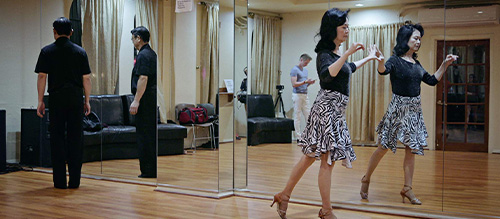Walk, Run, Cha-Cha – Oscar Nominated Documentary Short Review
Walk, Run, Cha-Cha (2019/2020)
Director: Laura Nix
“Before I learned dancing, I could only use my body to walk, to swim, to run. Today I can use my body to reach another level of freedom.”
2020 Oscar-nominated documentary short subject Walk, Run Cha-Cha is a personal and personable film that feels as much as if it is authored by the Vietnamese immigrant couple at the heart of the piece, Millie Cao and Paul Cao, as it does by its director Laura Nix, the central duo whose history together and immigration from Vietnam to the United States shares the screen with their new late-in-life passion of dancing the cha-cha.
Early promise regarding the subjects and their deeply personal but also universally empathy driving journeys into new lives half-way across the world is quickly eroded by the indecisive nature of what the piece seems to be intending to do – is it a movie about immigrants regaining their lost youth, or is it about dance? The film is unclear as to which it is more interested in, going so far as to make a point of including the Vietnamese couple’s dance teachers in the “featuring” credits alongside the actual subjects of the piece even in spite of the dance teachers’ lack of involvement in the film’s central narrative.
This indecisiveness seems to also be to blame for a lack of true investigation; the subjects being infinitely more interesting to hear from than to see dance, their journeys being absent from a lens that dictates the pains or the joys of their personal journeys, ignoring the moving words spoken to instead focus on their involvement in the relatively minor late-in-life activity they have each taken upon themselves to become well versed in.
This, of course, would be without issue or confrontation were the film to present the pursuit of perfection in cha-cha with passion and impact, but it doesn’t. Walk, Run, Cha-Cha, even as a title, quickly begins to feel less like a purposeful comment on the experience of its subjects and more like a surprising gem that came to the filmmakers by happenstance during their interview process, the film failing to capture the true freedom the attributed quote describes both in terms of its more traditional documentary content and its more expressive dance scenes.
Where Walk, Run, Cha-Cha does excel however is through its subjects. The couple’s honesty, how engaged they are and how philosophical they seem so naturally to be, are gemstones in an otherwise muddy bog, their lives more interesting than the documentary makes the effort to emphasise and their quirks being enough to draw the eye ahead of the film’s disappointing lack of presented intention. If Paul and Millie Cao had made this film, they seem like the kind of people who would have intentionally dismissed how extraordinary their own life journeys are, and they too would likely want to make a documentary celebrating the dance teachers who have brought them joy as they have grown old, but that is because they each seem too humble and too honest to do the job of a director, to bring focus upon the true heart of what is going on. The film’s actual director Laura Nix should have known better, and should have brought more focus to the strengths of their individual characters and their relationship, but she instead lost the true power of the narrative somewhere in the process, presenting a documentary short that was neither here nor there as a finished piece; a story of what could have been rather than what was.
Walk, Run, Cha-Cha is by no means bad, just seemingly unfiltered, as if the true beauty of the piece remains locked in mud, visible in glimpses but by no means the only defining factor of the film.
10/24
Watch Walk, Run, Cha-Cha for free via Vimeo here.


